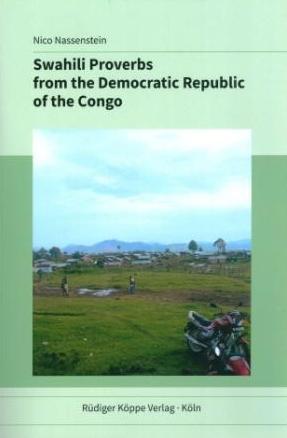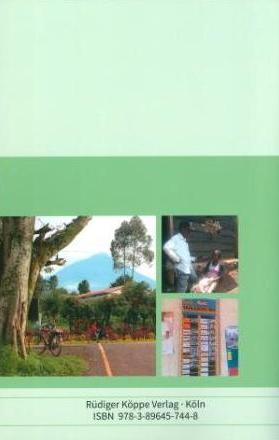

Swahili Proverbs from the Democratic Republic of the Congo
Author: Nico Nassenstein. Series edited by: Wilhelm J.G. Möhlig †.
Series: WK Verbal Art and Documentary Literature in African Languages Volume 44
2022136 pp.
3 colour maps, subject index
Text language(s): English
Format: 160 x 240 mm
300 g
Paperback
€ 34.80
Buy 'Swahili Proverbs from the Democratic Republic of the Congo' as a downloadable PDF document directly from our online shop »
Order 'Swahili Proverbs from the Democratic Republic of the Congo' as print edition »
The idea for the present book first arose out of a fascination for some Kivu Swahili proverbs that came up during a recording session on Kivu Swahili sentences with a Congolese colleague one day in Kampala (Uganda). The present editor was fascinated by their variability and the fact that proverbs could apparently easily be “transferred” by calquing them from Kinyabwisha, Mashi, and other languages. The fact that Swahili speakers’ use of proverbs from the Congo was thus characterized by fluidity and flexibility in their realization, dependent upon their linguistic backgrounds, trajectories, and creativity encouraged the editor to start collecting proverbs whenever working on Congo Swahili varieties.
All 400 proverbs presented here are part of this collection, numbering 100 proverbs from each Congo Swahili regiolect (Kivu, which comprises Goma and Bukavu Swahili; Bunia Swahili/Ituri Kingwana; Kisangani Swahili; Lubumbashi Swahili/Katanga Swahili), are extracted from discussions and recording sessions with the speakers themselves, all of whom are mentioned as having provided the editor with the proverbs (see the acknowledgments). The mixture of well-known and well-documented proverbs with very personal and spontaneous ones is intended to show the fluidity of this pool of orature.
The purpose of the present book, besides the personal interest in the rich orature exemplified by proverbs, is to serve as a dialectological introduction – which, as a first compilation, offers insights into the grammatical variability of Congo Swahili regiolects. So far, the dialectological classification of Congo Swahili has often been neglected, and established dialectological or dialectometric models successfully applied to the East African coast (for the most influential works, see Guarisma / Möhlig 1980; Möhlig 1983, 1986) seem to be of lesser benefit in the classification of Swahili regiolects in the DR Congo. Linguists may therefore be interested to discover differences and commonalities of the four major regiolects of Swahili in the Congo, while scholars of African literature may be more interested in the use and origin of the collected mafumbo (as they are labeled in the Congo, see above). All proverbs are categorized according to specific semantic fields.
Under these links you will find publications by the author, descriptions of further Congolese languages and cultures and reviews of the volume by Roberto Gaudioso and Odile Racine:
Accompanying material:
- A Lega and English Dictionary (D.25)
(ISBN 978-3-927620-39-1 ) - Bantu Languages
(ISBN 978-3-89645-705-9 ) - Directionality in Grammar and Discourse
(ISBN 978-3-89645-899-5 ) - La dynamique des noms de personnes chez les Ding de la République démocratique du Congo (1885–1960)
(ISBN 978-3-89645-896-4 ) - Language Change under Multilingual Conditions
(ISBN 978-3-89645-724-0 ) - Le lokonda des Ilángá la Bakonda (C.64)
(ISBN 978-3-89645-766-0 ) - Lexique comparé des langues bantu du Kwilu (République démocratique du Congo)
(ISBN 978-3-89645-564-2 ) - Luba-Sprichwörter
(ISBN 978-3-927620-61-2 ) - Tonrelationen in Luba-Sprichwörtern
(ISBN 978-3-927620-62-9 )
Cross-reference:
- African Languages in Global Society / Les langues africaines à l’heure de la mondialisation / Lugha za Kiafrika kwenye enzi ya utandawazi
(ISBN 978-3-89645-259-7 ) - African Media Cultures – Cultures de médias en Afrique
(ISBN 978-3-89645-246-7 ) - Afrophone Philosophies
(ISBN 978-3-89645-251-1 ) - Chanter l’existence
(ISBN 978-3-89645-287-0 ) - Dictionnaire des proverbes balant
(ISBN 978-3-89645-737-0 ) - Ngiti
(ISBN 978-3-927620-71-1 ) - Proverbs Finish the Problems – máakut(i) t’awá shuultáa
(ISBN 978-3-89645-284-9 )
Reviews
Compared to collections of proverbs in standard Swahili, which are only collected in alphabetical order, Nassenstein’s collection of proverbs in Congolese Swahili, although much more concise, offers a thematic index at the end of the book. The proverbs are classified into sixteen categories: age/respect, body/wellbeing, difficulty/problem, emotion, failure/loss/mistake, food/drink, life/death, love/sexuality, money/economy/success, nature/animals, power/deity, progress/change/learning, social relationships, time, words/knowledge, work. This index is a fundamental tool for working on a corpus of proverbs and sayings. [...]
A further key aspect of the book is that this collection offers a very important insight into the popular thought and verbal art of this area, and on the process of negotiation among different languages and cultures with different varieties of Swahili, local languages, Lingala and French. Also very interesting are the annotations that trace a transmission and communication between the verbal arts, such as the conveyance of proverbs and sayings through music (including modern music), especially in Lingala. This demonstrates the vitality of the verbal arts and their ability to act across genres, beyond traditional/modern categorisations. All these aspects are described in these four sections through footnotes. [...]
The book is a fundamental resource for those who wish to approach the verbal arts of the east of the Democratic Republic of Congo and for those who wish to deal with Swahili varieties.
[Full review:] http://www.serena.unina.it/index.php/jalalit/article/view/10036
Roberto Gaudioso in Journal of African Languages and Literatures, 4/2023, 120-125
Dans cet ouvrage, Nico Nassenstein, avec tous ceux qui ont collaboré avec lui, nous propose 400 proverbes issus des quatre variétés de swahili parlées en République démocratique du Congo (RDC), à savoir les swahilis du Kivu, d’Ituri (Bunia), de Kisangani et du Katanga/Lubumbashi. Ces proverbes ont été collectés alors que l’auteur menait des enquêtes linguistiques sur les différents dialectes swahilis du Congo. Ils ont été discutés et explicités par les informateurs (origine, morale, etc.). C’est la raison pour laquelle ils sont accompagnés de nombreuses annotations. Chaque proverbe est présenté selon une glose interlinéaire classique, avec un numéro propre à chacun, le texte en swahili (ligne du haut), la segmentation en morphèmes (ligne 2), l’analyse fonctionnelle de chaque morphème (ligne 3), la traduction (ligne 4) et enfin une explication de la métaphore véhiculée par le texte source (ligne 5). [...]
En conclusion, cet ouvrage est une petite lucarne vers la découverte de la littérature orale d’expression swahili en RDC. Il offre quelques phrases pour des variétés de swahili pour lesquelles il n’existe pratiquement rien. Il permet également d’avoir un aperçu sur les voyages de cette littérature orale à travers les langues et les cultures. Sa richesse et son intérêt résident non seulement dans la qualité de la présentation et des commentaires, ainsi que dans l’importante bibliographie sur le sujet, mais également dans son introduction remarquablement documentée.
Odile Racine in LLA Linguistique & Langues Africaines, 9(1)/2023, 1-4
PDF documents:
 | Review by Odile Racine in LLA Linguistique & Langues Africaines 9(1)/2023 | (≈ 436 kB) |
| « back | Print version | [top] |
 Books
Books Audio
Audio Biographies
Biographies Series
Series Festschrifts
Festschrifts Journals
Journals